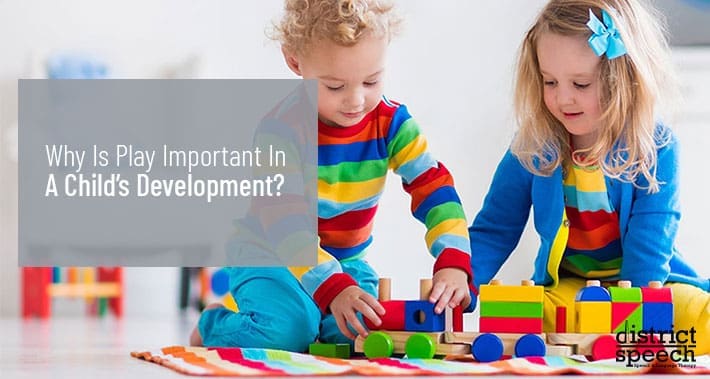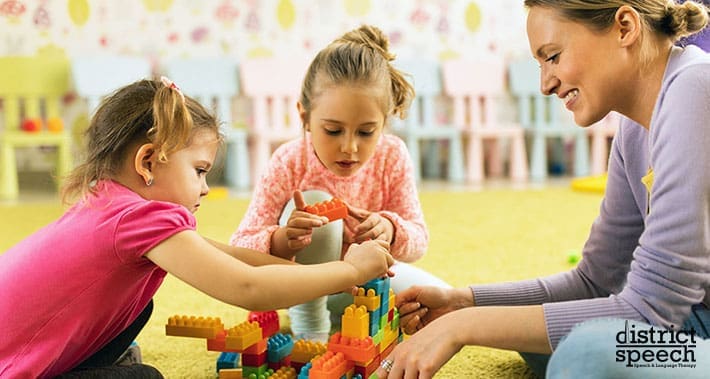
Here at District Speech, we provide speech therapy treatments for children.
But it’s more than just speech – it’s helping a child to better explore and understand the world around them.
The United Nations High Commission for Human Rights has declared play a basic right for every child, and there’s a good reason for it.
More than giving a child time to enjoy a time of carefree innocence, play helps children to better understand the world around them.
Our goal is a happy, healthy child.
Because speech and communication is a huge part of play, we thought we’d look at all the other ways play is important to your child, too.
Let’s take a look.
How Do We Define “Play”?
A lot of research has been done on how to define play, and what play is for children.
An interesting way to define play is ‘work’ for children.
They might not get paid for it (wouldn’t that be nice!) but their job is to build their behavioral, social, psychological, and motor skills.
When it’s at its best, it’s directed by the child, spontaneous, enjoyable, and rewarding.
Children can engage in imaginative play or play with toys that are both fun and designed for learning.
Here at District Speech, we frequently use toys and play in treating speech disorders in young children.
Some of our favorites include puzzles, alpha-bots, kinetic sand, Mr Potato Head, learning piggy banks, and even sidewalk chalk.
Benefits Of Play To A Child’s Development
The majority of children here in the Western world are lucky enough to have access to play.
However, children in developing countries often are engaged in labor and employment activities, even today.
This prevents them from enjoying the benefits of playtime.
On the other end of the spectrum, the benefits of play are so well established that most private schools mandate play for their students.
This is because they know how much it contributes to long term success.
Let’s take a look at what some of those benefits are.
1. It’s Good For Their Cognition
Playtime, from one perspective, is all skill learning and practice, embedded in a format that makes sense for the developing brain.
A child’s amazing, growing mind will automatically gather information as they play – about what works, and what doesn’t.
Jump starting their innate analysis and reason in a low stress environment helps their synapses to make healthy connections.
2. It Improves Physical Fitness
Remember the last time you hated the workout you’d set for yourself?
Kids don’t have that experience when they play – they just move, happily and naturally.
In fact, play is far superior to many types of exercise that focus on targeted muscle groups and repetition.
Play uses all muscle groups and usually incorporates cardio, as well.
It helps with gross motor skills, fine motor skills, better balance, and movement control.
Physiologically, this all contributes to strong muscles, better cardiovascular function, and bone density.
Play has been pointed to as an effective tool against rising obesity rates in American children.
Play helps kids to love being active, and to recognize it as the natural thing it is.
A child who grows up playing actively will find it easier to maintain physical health in adulthood too.
RELATED: How To Baby Proof Your Home When Your Baby Learns To Walk

3. It Helps Build Your Child’s Imagination
Play is creative by its very nature; by prioritizing playtime, you give your child the opportunity to let their imagination blossom.
Our imaginations contribute to our resiliency – they are a built in coping mechanism that goes far beyond mere daydreaming.
It’s very easy to understand parents that want only the best for their kids, who program their weeks with a multitude of classes, enrichment opportunities, and skills development.
However, it’s a powerful imagination that translates into the ability to think abstractly, allow for more advanced learning and improved problem solving skills.
Imagination helps kids to see possibilities instead of limitations.
4. It Helps Encourage Independence
Play is not just fun and creativity, but curiosity and exploration.
It’s true that most children (especially in our society) will almost always engage in play under the watchful eye of an adult.
However, it’s important that as adults, we don’t dictate how they play or control it too much.
Children very naturally adapt to what we say, and this limits them.
Instead, let your child direct their own play, even if you are a participant in that play.
By determining the outcome of their own play, children learn to think ahead, consider different options, draw on their own knowledge and experiences, and make choices.
All these contribute to building their independence, which stands them in excellent stead for the day they leave the nest.
The astrophysicist and educator Neil DeGrasse Tyson outlines it spectacularly in the video below:
“Kids are born scientists,” he says. “They’re always turning over rocks and plucking pedals off of flowers. They’re always doing things that by and large are destructive, and that’s what exploration kind of is. You take stuff apart, whether or not you know how to put it back together. This is what kids do. An adult scientist is a kid who never grew up. What happens at home is the kid reaches into the refrigerator, pulls out an egg, and starts juggling it. What’s the first thing you do as a parent? ‘[You say] stop playing with the egg, it could break. Put it back!’ Excuse me, this is an experiment in material strength. Let the kid find out that when it drops it breaks. This is a physics experiment! Rapidly turned into a biology experiment. The yolk oozes out, and you say ‘hey, that becomes a chicken one day.’ Wait, how does this gooey yolk become a chicken? Well that’s biology, check that out. And what did the egg cost you, 20 cents?”
Let your child explore independently, within the bounds of safety of course, and they’ll maintain that curiosity and independence into their adult life.
5. It Has Emotional And Behavioral Benefits
Kids are extremely intuitive, but they don’t always know what to do with that.
Children are in for a hormonal roller coaster when puberty arrives, and that can have a huge impact on their emotions and how they’re able to control them.
That’s why play is so crucial in the younger years.
It allows them to not only better understand their emotions, but calibrate how they behave in relation to those emotions.
It helps them to fine tune their ability to perceive emotions in others, and we can probably agree that raising a compassionate adult is a goal for most parents.
Behavior is frequently impacted by stress, in humans.
Self directed play is proven to reduce stress for most children.
6. It Helps Build Social Skills
I’m sure it’s no surprise at all that play will help your child build their social skills.
Allowing children to play with others – whether other kids or adults – allows them the experience of interaction.
Over time, the multitudes of interactions they accrue and process will help them to learn society’s rules and pitfalls first hand.
This means they learn them more deeply than when being admonished by an adult.
Children who play learn to both be compassionate with other kids and also develop and protect their own boundaries.
Playtime teaches them to communicate about their interests and passions with others.
This can help them find others with similar interests.
Play is what helps many children develop lifelong and profound friendships and community, which will provide support for your child as they grow.
RELATED: Speech Therapy Treatments For Social Communication Disorder
Book Your Appointment With District Speech
If you’ve noticed that your child doesn’t play as often with others as they do with family members, it could be because they are having speech issues that hinder their play.
Understanding the incredible value of play, we are dedicated to helping your child unlock their play potential.
We’re District Speech, and we provide speech therapy in Washington and the DC area.
Let’s get your child back in the swing by helping them learn better speech skills so that they don’t feel left out.
Book your appointment with District Speech today.
1300 I St NW, Suite 400 E,
Washington, DC 20005
- https://g.page/districtspeech
District Speech and Language Therapy specializes in speech therapy, physical therapy, and occupational therapy solutions, for both children and adults, in the Washington D.C and the Arlington Virginia areas.